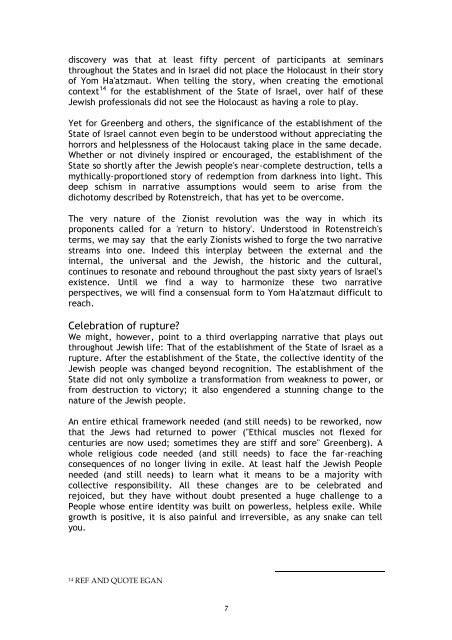printable pdf. - Makom Israel
printable pdf. - Makom Israel
printable pdf. - Makom Israel
You also want an ePaper? Increase the reach of your titles
YUMPU automatically turns print PDFs into web optimized ePapers that Google loves.
discovery was that at least fifty percent of participants at seminarsthroughout the States and in <strong>Israel</strong> did not place the Holocaust in their storyof Yom Ha'atzmaut. When telling the story, when creating the emotionalcontext 14 for the establishment of the State of <strong>Israel</strong>, over half of theseJewish professionals did not see the Holocaust as having a role to play.Yet for Greenberg and others, the significance of the establishment of theState of <strong>Israel</strong> cannot even begin to be understood without appreciating thehorrors and helplessness of the Holocaust taking place in the same decade.Whether or not divinely inspired or encouraged, the establishment of theState so shortly after the Jewish people's near-complete destruction, tells amythically-proportioned story of redemption from darkness into light. Thisdeep schism in narrative assumptions would seem to arise from thedichotomy described by Rotenstreich, that has yet to be overcome.The very nature of the Zionist revolution was the way in which itsproponents called for a 'return to history'. Understood in Rotenstreich'sterms, we may say that the early Zionists wished to forge the two narrativestreams into one. Indeed this interplay between the external and theinternal, the universal and the Jewish, the historic and the cultural,continues to resonate and rebound throughout the past sixty years of <strong>Israel</strong>'sexistence. Until we find a way to harmonize these two narrativeperspectives, we will find a consensual form to Yom Ha'atzmaut difficult toreach.Celebration of rupture?We might, however, point to a third overlapping narrative that plays outthroughout Jewish life: That of the establishment of the State of <strong>Israel</strong> as arupture. After the establishment of the State, the collective identity of theJewish people was changed beyond recognition. The establishment of theState did not only symbolize a transformation from weakness to power, orfrom destruction to victory; it also engendered a stunning change to thenature of the Jewish people.An entire ethical framework needed (and still needs) to be reworked, nowthat the Jews had returned to power ("Ethical muscles not flexed forcenturies are now used; sometimes they are stiff and sore" Greenberg). Awhole religious code needed (and still needs) to face the far-reachingconsequences of no longer living in exile. At least half the Jewish Peopleneeded (and still needs) to learn what it means to be a majority withcollective responsibility. All these changes are to be celebrated andrejoiced, but they have without doubt presented a huge challenge to aPeople whose entire identity was built on powerless, helpless exile. Whilegrowth is positive, it is also painful and irreversible, as any snake can tellyou.14 REF AND QUOTE EGAN7










